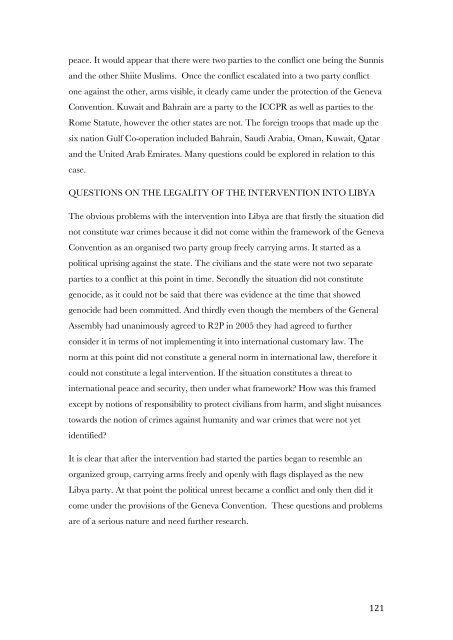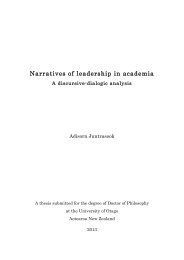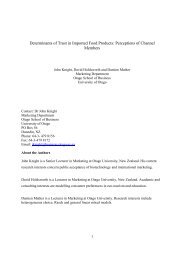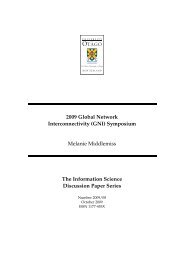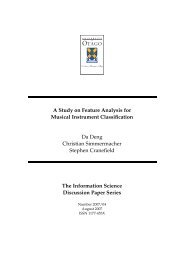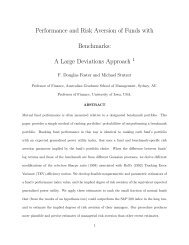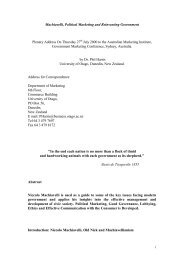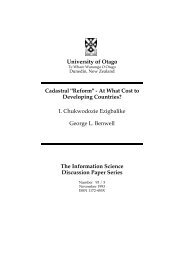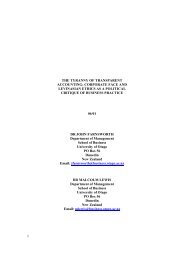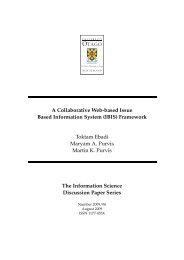Where is R2P grounded in international law? Anne-Marie Judson A ...
Where is R2P grounded in international law? Anne-Marie Judson A ...
Where is R2P grounded in international law? Anne-Marie Judson A ...
Create successful ePaper yourself
Turn your PDF publications into a flip-book with our unique Google optimized e-Paper software.
peace. It would appear that there were two parties to the conflict one be<strong>in</strong>g the Sunn<strong>is</strong><br />
and the other Shiite Muslims. Once the conflict escalated <strong>in</strong>to a two party conflict<br />
one aga<strong>in</strong>st the other, arms v<strong>is</strong>ible, it clearly came under the protection of the Geneva<br />
Convention. Kuwait and Bahra<strong>in</strong> are a party to the ICCPR as well as parties to the<br />
Rome Statute, however the other states are not. The foreign troops that made up the<br />
six nation Gulf Co-operation <strong>in</strong>cluded Bahra<strong>in</strong>, Saudi Arabia, Oman, Kuwait, Qatar<br />
and the United Arab Emirates. Many questions could be explored <strong>in</strong> relation to th<strong>is</strong><br />
case.<br />
QUESTIONS ON THE LEGALITY OF THE INTERVENTION INTO LIBYA<br />
The obvious problems with the <strong>in</strong>tervention <strong>in</strong>to Libya are that firstly the situation did<br />
not constitute war crimes because it did not come with<strong>in</strong> the framework of the Geneva<br />
Convention as an organ<strong>is</strong>ed two party group freely carry<strong>in</strong>g arms. It started as a<br />
political upr<strong>is</strong><strong>in</strong>g aga<strong>in</strong>st the state. The civilians and the state were not two separate<br />
parties to a conflict at th<strong>is</strong> po<strong>in</strong>t <strong>in</strong> time. Secondly the situation did not constitute<br />
genocide, as it could not be said that there was evidence at the time that showed<br />
genocide had been committed. And thirdly even though the members of the General<br />
Assembly had unanimously agreed to <strong>R2P</strong> <strong>in</strong> 2005 they had agreed to further<br />
consider it <strong>in</strong> terms of not implement<strong>in</strong>g it <strong>in</strong>to <strong>in</strong>ternational customary <strong>law</strong>. The<br />
norm at th<strong>is</strong> po<strong>in</strong>t did not constitute a general norm <strong>in</strong> <strong>in</strong>ternational <strong>law</strong>, therefore it<br />
could not constitute a legal <strong>in</strong>tervention. If the situation constitutes a threat to<br />
<strong>in</strong>ternational peace and security, then under what framework? How was th<strong>is</strong> framed<br />
except by notions of responsibility to protect civilians from harm, and slight nu<strong>is</strong>ances<br />
towards the notion of crimes aga<strong>in</strong>st humanity and war crimes that were not yet<br />
identified?<br />
It <strong>is</strong> clear that after the <strong>in</strong>tervention had started the parties began to resemble an<br />
organized group, carry<strong>in</strong>g arms freely and openly with flags d<strong>is</strong>played as the new<br />
Libya party. At that po<strong>in</strong>t the political unrest became a conflict and only then did it<br />
come under the prov<strong>is</strong>ions of the Geneva Convention. These questions and problems<br />
are of a serious nature and need further research.<br />
<br />
121


